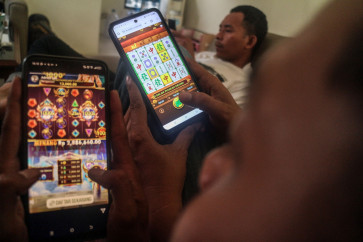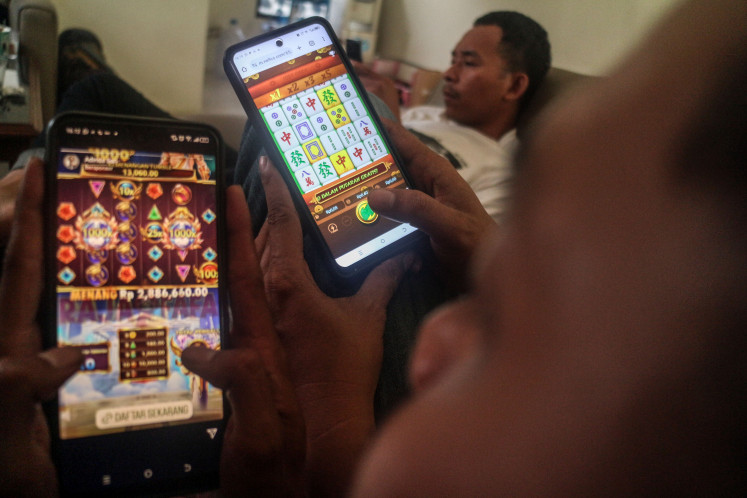Popular Reads
Top Results
Can't find what you're looking for?
View all search resultsPopular Reads
Top Results
Can't find what you're looking for?
View all search resultsRichardus Eko Indrajit: Smoothing way for IT literacy
RICHARDUS EKO INDRAJIT: (JP/Ary Hermawan) Compared to other technologies, information and communication technology (ICT) has seen the most rapid development in recent years, with new innovations being released every six minutes, according to ICT expert Richardus Eko Indrajit
Change text size
Gift Premium Articles
to Anyone
RICHARDUS EKO INDRAJIT: (JP/Ary Hermawan)
Compared to other technologies, information and communication technology (ICT) has seen the most rapid development in recent years, with new innovations being released every six minutes, according to ICT expert Richardus Eko Indrajit.
The pace is so remarkably swift that one must keep running to stay in tune with the latest gadgets -- although most of us probably end up stumbling in the back with our yesteryear' cellular phones. But, never mind, while technology may be growing rapidly, the principle of communication, Eko said, remains unchanged.
"Therefore, the ones who have to promote the use of ICT are not the ICT experts, but psychologists and those who study communications," he said during his visit to The Jakarta Post.
A graduate of Harvard University -- where he studied applied computer science -- and holder of master's degrees in business and management, Eko is currently one of the most renowned ICT experts and practitioners in the country.
Eko has given many lectures in universities and has held seminars, written dozens of books and articles, and has spoken for a number of government and non-governmental organizations about the promises and the predicaments of ICT.
Technology is often perceived ambivalently. ICT, in this regard, is the epitome of what German philosopher Martin Heidegger meant when he said technology offered a great advantage and posed a great risk at the same time.
Eko knows well the risks and advantages. He is the president director of ICT and management consulting firm PT Renaissance Sentra Indonesia as well as executive chairman of the newly-formed internet watchdog Indonesia-Security Incident Response Team on Internet Infrastructure (ID-SIRTII).
Information, he believes, is an asset that increases in value in line with the development of ICT.
"We used to believe that for a country to achieve wealth, money, men, machines and material were required. It is today no longer the case," he said.
He gave an interesting example of how Indonesia, a big country rich in natural and human resources, could damage its economy by providing false information.
Imagine the Central Statistics Agency announced that 90 percent of the country's population was female. What would the ministers probably do?
"The defense minister would be thinking of procuring soft, colorful rifles as more females would join the military. The manpower minister would be happy to send more migrant workers abroad. Meanwhile, the religious affairs minister and the finance minister would sign a joint agreement to provide incentives for men who do polygamy," he said, jokingly.
"But what if it turned out that most of the female population in the country were babies after the government had already passed the state budget into law? All the programs set by those ministers would be useless."
The point he was trying to make was simple: Information is crucial in decision making. Hence, embracing ICT, which has proliferated the flow of information to the point where thousands of books can be stored on a tiny disk, is a must for any country to stay competitive.
Indonesia is slow in responding to this challenge, he said. The number of internet users here is low compared to other countries due to price barriers, while the government has not yet fully benefited from the e-government concept.
"The use of computers for ICT in governmental offices does not mean that the e-government concept has been applied because we do not know if those devices really enhance the government's performance," he said.
He said technology was no more than an instrument for transforming a bureaucratic government into a service provider for its consumers: citizens and business communities.
The e-government concept, which has been applied in the United Kingdom and the United States, is necessary because it improves the quality of services, transparency and accountability while reducing the cost of interaction and communication for government agencies, he said.
He thus questioned the government's policy of providing free electronic books on the internet.
"The internet is still very expensive here and there will not be many people who will download the books. Why don't they put the books in a data storage so that people can copy them easily," he said.
In November 2007, he was appointed head of ID-SIRTII, which is tasked with supervising internet traffic.
"The role we have is like that of the PPATK (Financial Transaction Reports and Analysis Center), only the objects of our supervision are the internet traffics," he said.
The ID-SIRTII was established to reduce internet crimes, including hackings.
"We only supervise the traffic, but we do not check the content. We are not authorized to do that, although we are technically able to do it," he said.
He said many of the security systems used by governmental offices and private companies were still vulnerable to hacking.
"This could be a problem, especially for vital agencies such as airport operator Angkasa Pura and state electricity company PT PLN," he said.
He added, however, that if the two companies still use old devices which are not connected to the Internet and have not embraced the latest technology in their operations then people have nothing to worry about.
Born in Jakarta in 1969, Eko studied informatics engineering at Sepuluh November Institute of Technology in Surabaya, East Java, graduating in 1992.
A year later, he received a scholarship from state oil company Pertamina to study at Harvard University. During his tenure at the prestigious university, he also studied at Boston University and Massachusetts Institute of Technology (MIT).
Upon returning to Indonesia, Eko joined a multinational consulting company and received a master's degree in business administration through a long-distance study program with Leicester University, the U.K.
In 1999, he achieved a PhD from the University of the City of Manila, the Philippines.
"Every time I broke up with a girlfriend, I began a new master's degree," he joked.










